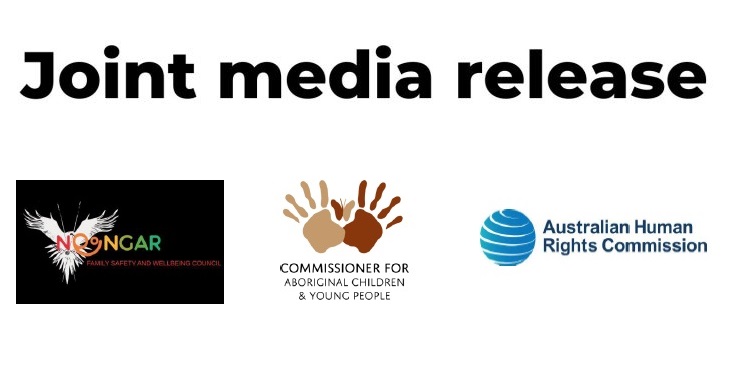The 17th session of United Nations Expert Mechanism on the Rights of Indigenous People (EMPRIP) in Geneva, Switzerland highlighted Aboriginal and Torres Strait Islander child removals with interventions on 9 July by United Nations member on the Permanent Forum for the Rights of Indigenous Issues Associate Professor Hannah McGlade, South Australian Commissioner for Aboriginal Children and Young People April Lawrie and Australian Human Rights Commissioner for Aboriginal and Torres Strait Islander Social Justice Katie Kiss.
Participants at the session highlighted issues in relation to the United Nations Declaration on the Rights of Indigenous People. The three advocates powerfully amplified the rights of Aboriginal and Torres Strait Islander children and highlighted the ongoing crisis of removals of Aboriginal and Torres Strait Islander children from their family, community and culture. On the closing day, EMRIP made proposals to the United Nations Human Rights Council. Proposal 14 is that state government authorities should ‘support and meaningfully facilitate the right of self-determination for Indigenous peoples’, recognising self-determination is critical for Indigenous peoples when addressing child welfare matters. Listen at 29:42.
In 2023, Associate Professor McGlade and the Noongar Family Safety Wellbeing Council requested EMRIP’s country engagement visit to Western Australia, visiting Perth, Albany, and Geraldton where they met with local Aboriginal people and communities to gain insight into the overrepresentation of Aboriginal and Torres Strait Islander children in out-of-home care. The terms of reference included EMRIP representatives providing advice and guidance to the Aboriginal and Torres Strait Islander community and government supporting self-determination and the Aboriginal Community Controlled sector. Associate Professor McGlade highlighted that in partnership with SNAICC, the National Voice for Aboriginal and Torres Strait Islander children, Western Australia had developed a 10-year roadmap to reduce the over-representation of Aboriginal and Torres Strait Islander children in out-of-home care. However, no progress has been made on implementation more than 12 months on. This roadmap includes the establishment of a dedicated Aboriginal and Torres Strait Islander Children’s Commissioner, with powers equal to the Commissioner for Children and Young People.
Commissioner Kiss expressed her support and welcomed the report of EMRIP’s Western Australian visit. Currently, Aboriginal and Torres Strait Islander children are 10.5 times more likely than non-Aboriginal children to be in out-of-home care nationally, and recent reporting found that 22,328 Aboriginal and Torres Strait Islander children are in out-of-home care in Australia. Australia forcibly removes 57 Aboriginal and Torres Strait Islander children per 1000 compared to five non-Indigenous children per 1000. Commissioner Kiss highlighted the issue as a significant human rights challenge facing Australia today, and that exposure to discriminatory systems is causing harm and fuelling a pipeline into negative life trajectories. Commissioner Kiss stated that Australian states and territories have considerable work to do when it comes to the rights of Aboriginal and Torres Strait Islander families and children, with Western Australia chief among them.
In South Australia, Commissioner Lawrie recently published the final report of her independent inquiry titled, Holding on to Our Future, focused on the implementation of the full Aboriginal and Torres Strait Islander Child Placement Principle (the Principle) with regard to Aboriginal and Torres Strait Islander child removals. In her statement to EMRIP, Commissioner Lawrie recommended that the Principle be embedded in legislation and policy as a framework for preventing removals. Commissioner Lawrie stated that the Principle is the embodiment of the Declaration on the Rights of Indigenous Peoples, and the United Nations Convention on the Rights of the Child, as it enables self-determination for Aboriginal and Torres Strait Islander families and communities and protects the rights of our children to their family and their cultural identity. Commissioner Lawrie recommended that the Principle be recognised as a fundamental human rights framework and that the Aboriginal community be legally empowered to implement its own kinship care legislation. Commissioner Lawrie reinforced Associate Professor McGlade’s call for the Western Australian government to prioritise the establishment of an Aboriginal and Torres Strait Islander Children’s Commissioner. Later in the week, Commissioner Lawrie provided a further statement about disproportional Aboriginal child removal rates sky-rocketing out of control since the South Australian Government withdrew the primacy of the best interests of the child and diminished the Principle in its new child protection legislation in 2017.
Australia endorsed the Declaration on the Rights of Indigenous Peoples in 2009 but it has not been enacted into domestic legislation or responded to the Senate Inquiry into UNDRIP. This includes the call for a national action plan. Further, Australia has not ratified the Optional Protocol to the UN Convention on the Rights of the Child, denying children a right to review by the UN expert body.
Despite the Closing the Gap Target 12 (to reduce the over-representation of Aboriginal and Torres Strait Islander children in out-of-home care) and the Safe and Supported National Aboriginal Action Plan, in South Australia alone, it is predicted that 10 in 140 Aboriginal and Torres Strait Islander children will be in care by 2031.
EMRIP has recommended that Australia take actions towards genuine self-determination for Aboriginal and Torres Strait Islander people in child protection. As signatory to both the Declaration on the Rights of Indigenous People and the UN Convention on the Right of the Child, Australia must hold primacy of the right for self-determination and the best interests of the child in laws, policy and actions to improve outcomes for Aboriginal and Torres Strait Islander children, families and communities.
EMRIP’s report on the 17th session is expected to be published in September 2024.
MEDIA CONTACT: Leah Manuel 0422 006 647 | leah@manuelcommunications.com.au


Recent Comments